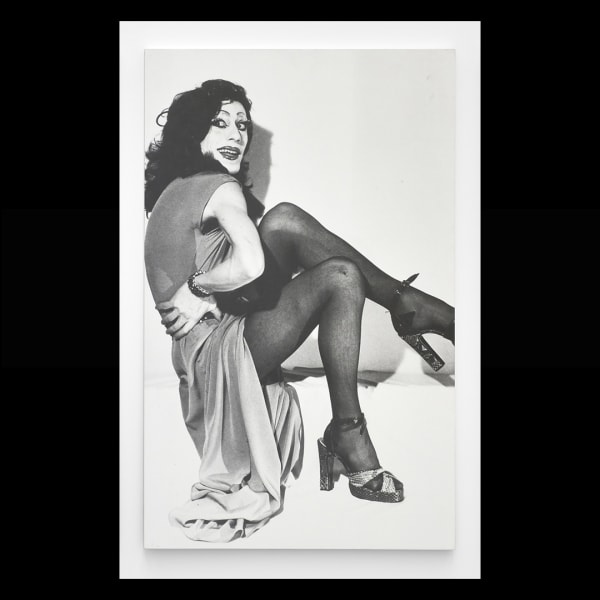Rediscovered after his death in 1995, French artist Michel Journiac was one of the founders of the Body Art movement called « Art Corporel », along with Vito Acconci, Bruce Nauman, Hermann Nitsch, Chris Burden and Gina Pane. His radical and authentic approach fundamentally questions the artistic experience. Often introduced in a rather reductive manner as the inaugural manifestation of his practice, the « Messe pour un Corps » (Mass for a Body) 1969, recreated and filmed in 1975 — during which the artist, former seminarian, celebrating a genuine mass, served up a sausage made from the contents of three syringes full of his own blood as the « communion sacrement » — was described at the time by art critic François Pluchart as « art history’s first faux-pas » and is seen to this day as one of the most decisive manifesto actions in this otherwise heterogeneous movement.
Journiac’s body of work actually cuts across all artistic practices of his time, from conceptual to sociological art, from the object to the photographic document, from personal mythology to pop imagery. Even though blood appears to be his work’s emblematic material, as the vital fluid at the crossroad of sacred and social symbolisms (from the Christlike gift to brotherly exchange, from the violence of struggle to medical transfusion, from a sign of life to the smell of death…), Journiac also invested and deeply branded numerous appropriations of artistic materials.
Such is the case for clothes : from the « Lessive » (Laundry) and its fossilized pieces of clothing, a sculptural and socio-critical work created in 1969, to cross-dressing (like in « 24 heures de la Vie d’une Femme Ordinaire » (24 hours in the Life of an Ordinary Woman), a famous series of photo-story-like portrayals of himself in drag in different quotidian scenes representing women’s fantasies) ; for objects : by initiating, beyond Duchamp’s ready-made, some kind of « ultra-diversion » going beyond the situationist theories and aiming at the establishment of some form of sublimation of the negative (creating for example a life-size replica of the guillotine (« Piège pour une Exécution Capitale » (Trap for an Execution) 1971, filmed in 1979) in order to abolish the death penalty as an object first, to the subversion of contemporary art objects revised in the critical light of his own « bodily » materials, « Parodie d’une Collection » (Parody of a Collection) 1971 ; such is even the case for the signs or media of the exchange value : from gold (offering in the « Contrat pour un Corps » (Contract for a Body) 1972, to transform your skeleton into a work of art following three kinds of contracts, favoring either the aesthetics, or the object, or the sociological aspect, the latter involving the gold-plating of your remains) to the conceptual substitute of commercial exchange (« Manifeste pour un Chèque » (Cheque Manifesto) 1971), all the way to banknote sheets (« Monnaie du Sang » (Blood Money) 1994).
Critical assessment, parodic subversion, ambiguous provocation to action, to exchange, to the sublime, the body that he calls « a conscious socialized meat » is always considered by Journiac not only as a « fundamental given » of the human experience, but mostly as a question and an objection opposed to the forms of arbitrariness (aesthetic, political, sexual…). This practice of committed objection in all aspects of existence turns Journiac into some kind of « body realist » whose entire work balances on a knife-edge. (...)
Deeply impacted by the AIDS pandemic from the early 1980’s, Journiac’s work will evolve until his death towards an unprecedented artistic practice, some sort of widespread compassionate work or Stations of the Cross of an altered body, going through a « Dispositif de Meurtre et Inauguration » (Murder Apparatus and Inauguration) 1985, in which the artist denies himself and devotes himself, body and soul, to a « Rituel de Transmutation du Corps Souffrant au Corps Transfiguré », a « Transmutation Ritual from the Suffering Body to the Transfigured Body », a « pure gift and definite refusal » of the inalienable conditions of the living.
Vincent Labaume.
Art Basel 2021: Feature w/ Michel Journiac
https://www.artbasel.com/stories/european-art-history-michel-journiac-stephane-mandelbaum-jean-dupuy

